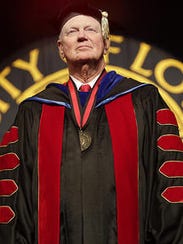After another fiery clash between trustees, President James Ramsey’s adversaries Thursday blocked a proposed 5 percent tuition hike for students that would have raised those costs for in-state residents by $526 a year.
Ramsey’s staff told the Board of Trustees’ finance committee that the tuition hike was essential to avoid an $18 million deficit after cuts in state funding for higher education under Gov. Matt Bevin’s budget.
UofL President James Ramsey
But Trustee Craig Greenberg, saying “we can’t keep funding the university on the back of the students,” suggested it instead avoid the increase by using some of the $38 million that the university last year loaned to the University of Louisville Foundation.
“It seems to me that the foundation should be supporting the university, not the university supporting the foundation,” he said.
Ramsey, however, defended the transfer of the money to the foundation, calling it a “cash management strategy” and “just a way to get the highest return we can.”
Ramsey supporter Ron Butt, the panel’s chairman, said the foundation will pay the university 1 percent interest on the money, compared with the ¼ of 1 percent it was previously earning. “If you run a business, you move money routinely between companies," said Butt, who after the meeting denounced Greenberg’s suggestion as "irrational" and “extremely reckless."
Jason Tomlinson, the foundation’s chief financial officer, said the money couldn’t be spent to avoid tuition increases or for other operational expenses because it is in effect the university’s “emergency fund.”
Greenberg, though, said that faced with tuition increases, after 17 years of state budget cuts, “It seems like we have an emergency now.”
And when Butt called for a second to his motion to approve the recommended tuition hike, Pamela Feldhoff moved the motion, but the other three members on committee – Greenberg, Steve Campbell and Jonathan Blue – refused to give him one.
“I guess the motion fails,” Butt said. “Now we start over again.”
The surprise development leaves the university without a budget. The committee, which must propose a budget to the full board, has no meetings scheduled. Ramsey told the university community in an email late Thursday that "we’re confident that we’ll get to an approved budget in the very near future."
Butt told reporters after the meeting that Ramsey's opponents were “grandstanding” on behalf of a “private agenda,” although he said he doesn’t know what that agenda is. Without the tuition increase, he said, the university would have to lay off faculty or “close a building,” which he said also would hurt students.
But during the acrimonious session, Greenberg challenged the transfer and Butt’s defense of it, calling him and allied trustees “masters of obfuscation.”
Defending his acumen, Butt, a certified financial planner, shot back that he has a degree in finance. And Dr. Bob Hughes, who chairs the foundation’s board and also is a trustee, accused Greenberg of political speechmaking.
Under a deal approved last July, the foundation’s real estate unit can use the $38 million for up to three years for road projects and acquiring property, while paying interest of 1 percent. Tomlinson told WDRB.com, which first reported the arrangement, that it benefits both the university and foundation and represents “basic cash management” between two organizations that exchange funds every month.
Under the proposal, tuition would increase 5 percent for both in-state and out-of-state undergraduates. Tuition would rise to $11,608 for the former and to $26,090 for the latter. Costs for on-campus housing also would increase by 2 percent.
Susan Howarth, the university vice president of finance, told the committee that the tuition increase is required because the university must absorb 4.5 percent reduction in its state funding over the next two budget years, starting July 1. The tuition increase also would pay for 2 percent raises for faculty and staff, she said.
But she said about 30 percent of the $18 million the tuition hike would generate would be plowed back into student loans, which would lessen the burden on some students. Provost Neville Pinto also said the university would adopt a “credit for credit” program in which student who complete 30 hours a year would get a $400 credit on their tuition the next fall.
The proposed budget also called for an additional $500,000 reallocated from the president’s and provost’s office budgets for student need-based aid; a 5 percent increase in student aid; and $100,000 to ensure UofL’s lowest-paid employees are making a living wage.
The meeting drew several trustees who don’t serve on the finance committee, including Chairman Larry Benz, who said he opposed any increase in tuition and noted that students would be paying for the faculty raise.
The 5 percent hike is the maximum that public universities in Kentucky may raise tuition under rules set by the Council on Postsecondary Education.
Greenberg, however, said, “Just because we can raise tuition doesn’t mean we have to.”

No comments:
Post a Comment